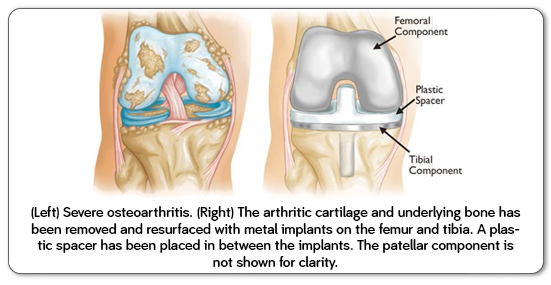+918048051936

This is your website preview.
Currently it only shows your basic business info. Start adding relevant business details such as description, images and products or services to gain your customers attention by using Boost 360 android app / iOS App / web portal.
Cause of Knee Replacement Knee replacement surgery...

Cause of Knee Replacement Knee replacement surgery is a treatment for pain and disability in the knee. The most common condition that results in the need for knee replacement surgery is osteoarthritis. The most common cause of chronic knee pain and disability is arthritis. Although there are many types of arthritis, most knee pain is caused by just three types: osteoarthritis, rheumatoid arthritis, and post-traumatic arthritis. Osteoarthritis is characterized by the breakdown of joint cartilage. Damage to the cartilage and bones limits movement and may cause pain. People with severe degenerative joint disease may be unable to do normal activities that involve bending at the knee, such as walking or climbing stairs, because they are painful. The knee may swell or "give-way" because the joint is not stable. Other forms of arthritis, such as rheumatoid arthritis and arthritis that results from a knee injury, may also lead to degeneration of the knee joint. In addition, fractures, torn cartilage, and/or torn ligaments may lead to irreversible damage to the knee joint. If medical treatments are not satisfactory, knee replacement surgery may be an effective treatment. Some medical treatments for degenerative joint disease may include, but are not limited to, the following: Anti-inflammatory medications Glucosamine and chondroitin sulfate Pain medications Limiting painful activities Assistive devices for walking (such as a cane) Physical therapy Cortisone injections into the knee joint Viscosupplementation injections (to add lubrication into the joint to make joint movement less painful) Weight loss (for obese persons) There may be other reasons for your doctor to recommend a knee replacement surgery. Description The disadvantages of partial knee replacement compared with total knee replacement include: An infection at the surgical site is possible. Blood clots are a risk as are injuries to a blood vessel or a nerve. These complications are quite rare. Slightly less predictable pain relief You may experience some knee joint stiffness. Potential need for more surgery. For example, a total knee replacement may be necessary in the future if arthritis develops in the parts of the knee that have not been replaced. Late complications may include infection and a failure, loosening, or dislocation of the prosthesis as well as continued pain. Risks of the procedure As with any surgical procedure, complications can occur. Some possible complications may include, but are not limited to, the following: Bleeding Infection Blood clots in the legs or lungs Loosening or wearing out of the prosthesis Fracture Continued pain or stiffness The replacement knee joint may become loose, be dislodged, or may not work the way it was intended. The joint may have to be replaced again in the future. Nerves or blood vessels in the area of surgery may be injured, resulting in weakness or numbness. The joint pain may not be relieved by surgery. There may be other risks depending on your specific medical condition. Be sure to discuss any concerns with your doctor prior to the procedure.

